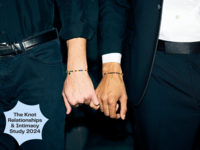How to Be Romantic and Show Affection in a Relationship

You're head over heels for your partner and want to make your relationship work. To learn how to show love, including picking the right romantic gestures, we spoke with two experts. Dr. Alexandra H. Solomon is a licensed clinical psychologist on the faculty at Northwestern University and the host of the podcast, Reimagining Love and Beverly B. Palmer, Ph. D. is a licensed clinical psychologist and a psychology professor at California State University Dominguez Hills.
First, What is Romance?
Romance is the cultivation of an experience that invites a couple to feel playful, connected, present and engaged with each other, explains Dr. Solomon. In this passionate and energized state, they're more likely to desire sex, she adds. Romance is also associated with the romantic myth, says Dr. Palmer. "You fall in love with an ideal mate, your love is exclusively for that mate and your initial feelings for your partner will never change."
10 Ways to Be Romantic and Show Affection
Romance is not necessarily candles or flowers, says Dr. Solomon. Instead, it's whatever takes the two of you out of ordinary life and lets you show each other the extent of your love. For one couple, that might involve getting a six pack of beer and watching football. For another, it could mean going to the opera. It's not the specific activity—it's the intentionality, adds Dr. Solomon. Here are some ways to up the romance ante in your own relationship.
Put Down Your Phone
"The best way to show affection is to be present with your partner," says Dr. Palmer, also the author of Love Demystified: Strategies for a Successful Love Life.) Give them your undivided attention. Since we all have a fundamental need to be heard, when our partner truly listens and understands us, this cements our relationship, she adds. Above all, put down your phone, counsels Dr. Solomon, to show your partner that they are your priority.
Have a Weekly Date
Make dates a regular part of your week or month. Sometimes, just getting away from the daily routine through a walk or talk at a local park can increase romantic feelings, says Dr. Palmer. If regular dates seem impossible, broaden your definition of "date," suggests Dr. Solomon. A date can even mean a walk on a Monday morning or a quick coffee after work.
Communicate What You Want
Romance is personal. You and your partner might have different ideas and expectations, says Dr. Palmer. Maybe you prefer to receive gifts, while they most appreciate words of affirmation. Learn what your loved one wants—then give this to them. That way, neither of you will play a guessing game.
Do Something New Together
Sharing a fun novel experience can spark affectionate feelings in a relationship, says Dr. Palmer. Try something new like roller skating, dancing, or going on a challenging hike, she suggests. "The more physically active you are together, the more the 'feel good' neurotransmitter of dopamine is spiked."
Write Love Notes
A particularly romantic gesture is to leave a note of affection in your partner's briefcase or lunch box, recommends Dr. Palmer. "It's this element of surprise that is especially welcomed." Don't feel you have to craft an elaborate poem. Even a simple, "I'll be thinking of you today. I love you so much" would suffice.
Touch Often
Keep physical affection in your repertoire, urges Dr. Solomon. Touch frequently enough that touch doesn't always mean a prelude to sex, she adds. "Physical touch will remind you and your partner that you share something special that you don't share with others."
Keep Track of the Positive-to-Negative Ratio
According to The Gottman Institute, every successful couple needs a ratio of five to one of positive to negative interactions. Basically, five positive interactions will counteract each negative interaction, whether it's a criticism or a phone snub. This is important since humans tend to have a negative bias, remembering the negative more than the positive, explains Dr. Solomon.
Talk About Non-Mundane Topics
Sure, you and your partner need to discuss quotidian details, like who is going to walk the dog or take out the trash. But, if you only discuss the mundane, your relationship will eventually feel mundane too. That's why it's worth the effort to also talk about big ideas and share personal thoughts and feelings. Having deep conversations helps release oxytocin, the bonding hormone.
Play Together
Since being an adult can feel like a slog, it's helpful to step out of your responsible self and be silly with your partner. Tease each other, giggle and have fun. Although it might seem ridiculous, initiate a pillow fight or even prank your loved one. Since you likely aren't playful with anyone else, putting your guard down in this way will make your other half feel special.
Surprise Your Partner
Over the years, we can become predictable to our loved ones. To inject a dose of novelty, occasionally try to do something unexpected to keep them guessing. That way, you'll still see each other as a bit of a mystery and will be motivated to keep discovering each other. Whether you paint a portrait of them or cook them their favorite meal for the first time, you'll bring about a sense of delight.
How Does Being More Romantic Build a Healthy Relationship
Romance is essential to long-term relationships because so much of life is mundane—domesticity and romance live in opposition to each other, says Dr. Solomon. "So much of loving someone long-term is decidedly unromantic."
When you and your partner invest energy to create the conditions for romance, you each feel cherished, seen, heard and celebrated, she adds. This encourages emotional intimacy, which leads to sexual intimacy. "Romance is the fuel that keeps people excited and proud about being a couple," she concludes.























